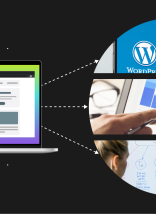These days everyone is looking to save a few bucks, but is your web hosting account a good place to start? Let’s explore the economics of web hosting a bit so you can see what you’re really paying for.
With hosting prices as low as $5 a month you have to ask yourself what kind of service you can really buy for that amount of money. After all you can’t even buy a good fast-food meal for that price.
The economics for cheap hosts is roughly the same as it is for high quality hosts who might charge as much as $75 a month for what appears is an equivalent account. Cheap hosts still want to make a profit just like the quality hosts. They just have to do more with less so corners need to be cut.
Here are some examples:
Internet Connectivity/Bandwidth – You may not think so, but there are different grades of bandwidth and different ways of delivering it. Technically awebsite can be hosted off a cable-modem, which isn’t to say this is what cheap
hosts do, but they often use the least expensive providers of bandwidth and often there is no redundancy in their networks. It’s up to 50% cheaper than doing it the right way with tier1 bandwidth providers and redundant routing through different providers.
Power – Power can be one of the most expensive parts of delivering hosting or datacenter services. Leading hosting providers use redundant power circuits with battery backup and generator power, cheap hosts normally have a single feed to each server and fortunately often have battery backups and generators. Often the power capacity isn’t sufficient so if there is a power outage some services still get interrupted.
Servers – Leading hosts use high quality server-grade hardware from reliable manufacturers, cheap hosts often use PC-grade hardware. Under continued high load PC-grade hardware doesn’t stand up well to the load and can fail.
Support – Hiring good people with technology experience that know what they are doing isn’t cheap. Often cheap hosts hire entry-level people to follow predefined support scripts to save money. The relative number of hosting accounts per support rep is often higher for cheap hosts, which means each rep spends less time per customer each month.
Performance and Site Density – Each server a hosting company purchases costs them money in a couple different ways. 1) initial hardware cost 2) operating system cost 3) setup cost 4) maintenance cost 5) power and cooling costs 6) rack/space costs The more sites you can put on a single server the better your economics get from a utilization perspective. The only trouble is that if a server is overloaded it won’t perform well and your site may either load slowly or not at all. As a general rule of thumb you wouldn’t want any individual server to run higher than 50 or 60% utilization during normal usage. This is to allow sufficient headroom so that during peak utilization (such as an unexpected spike in traffic for several sites) the server can easily service the spike and overall performance won’t be affected. The economics of cheap hosting dictate a higher utilization rate and consequently performance is often affected.
Backup – Backup software and storage is expensive. Proper backup routines create several full copies of data and often many partial copies for daily incremental backups. In most cases the costs to do proper backups put them completely out of the realm of something a cheap host can provide. If you are working with a cheap host you better make sure you are performing your own backup routine.
Conclusion:
Our normal hosting plans start at $25/month. The difference between a cheap host and our quality hosting plans is $20 or less, so the question you should ask yourself is “do you feel lucky?”. If you’re lucky, your cheap host will perform just fine and your business won’t be affected. If you’re not lucky, the $20 you saved just might cost your business a whole lot more in downtime and aggravation.









